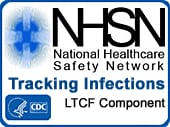Be a Safe Resident
Patients and residents of nursing homes, assisted living facilities and other long-term care facilities should be aware that you have a higher chance of getting an infection when living at one of these facilities you they likely would at home.
Use the resources on this page to keep yourself and your loved ones safe.
- Top 10 Infection Prevention Questions to Ask a Nursing Home’s Leaders pdf icon[PDF – 2 pages]
- What to Ask Your Healthcare Provider about Antibiotics pdf icon[PDF – 2 pages]
- What You Need to Know About Antibiotics in a Nursing Home pdf icon[PDF – 1 page]
- Patient Safety: What You Can Do to Be a Safe Patient
CRE Infection (Carbapenem-resistant Enterobacterales)
CRE Information
CRE are germs that are difficult to treat because they are resistant to the drugs (antibiotics) used to treat them.
You are most at risk for a CRE infection if you require a device like a:
- ventilators (breathing machines)
- urinary (bladder) catheters
- intravenous (vein) catheters
CAUTI (Catheter-Associated Urinary Tract Infection)
CAUTI and UTI Information
An indwelling urinary catheter is a drainage tube that is inserted into the urinary bladder, which is left in place and connected to a collection bag. A CAUTI occurs when germs (usually bacteria) enter the urinary tract through the urinary catheter and cause infection.
Stomach Flu (Norovirus)
Norovirus Information
Stomach flu is caused by the Noroviruses. Symptoms include severe vomiting and diarrhea. Stomach flu is usually brief in people who are otherwise healthy. Young children, the elderly, and people with other medical illnesses are most at risk for more serious infection. Like all viral infections, noroviruses should not be treated with antibiotics.

